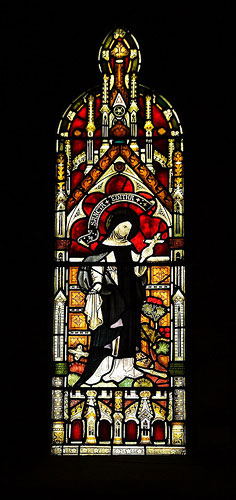
Feastday: July 6
The St. Modwenna, or Monenna, formally venerated at Burton-on-Trent and elsewhere, may have lived in the middle of the seventh century and been a recluse on an islet called Andresey in the Trent. But not only are other and conflicting things alleged of her, but her legend has been confused with that of the Irish saint Darerca, or Moninne, said to have been the first abbess of Killeavy, near Nerwy and to have died in 517; and she has perhaps been confused with others as well. Capgrave and others speak of St. Modwenna as having charge of St. Edith of Polesworth, which were it true would throw no useful light on either saint. The most valuable information we possess about St. Moninne seems to be the entry in the Felire of Oengus: "Moninne of the mountain of Cuilenn was a fair pillar; she gained a triumph, a hostage of purity, a kinswoman of great Mary", with the gloss. Her feast day is July 6.
For Saint Moninne of Ireland, see Moninne.For the property company, see St. Modwen Properties.Modwenna, or Modwen, was a nun and saint in England, who founded Burton Abbey in Staffordshire in the 7th century.
According to the medieval Life of St Modwenna she was an Irish noblewoman by birth and founded the abbey on an island in the River Trent. Modwenna spent seven years at the abbey with two other Irish nuns called Lazar and Althea, before the three embarked on a pilgrimage to Rome. Upon their return to England they built a church at Stapenhill in honour of Saint Peter and Saint Paul.
Modwenna is reported to have performed many holy miracles at Burton Abbey, and to this day the well on the site is said to have healing properties. After a time Modwenna left Burton-upon-Trent and travelled to Scotland where she died in Langfortin, near Dundee, reportedly at the age of 130. Her body was returned to Burton-upon-Trent for burial. Another abbess and saint, Osyth (died 700), was raised under Modwenna's direction.
Others, however, say that she has been confused with St Monenna (Moninne) of Ireland and with a Scottish saint also called Modwenna, and that the Anglo-Norman text of her life has little historical value. This may be how she comes to be associated with Alfred the Great, whom she is said to have known, even though he lived in the 9th century, some two hundred years later.
St Modwen's, Burton upon Trent is dedicated to her as is the chapel at Pillaton Hall.

